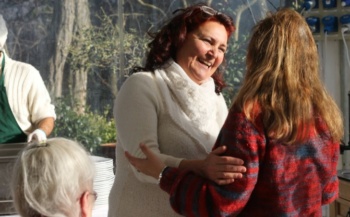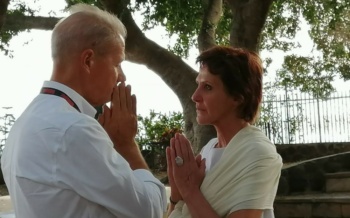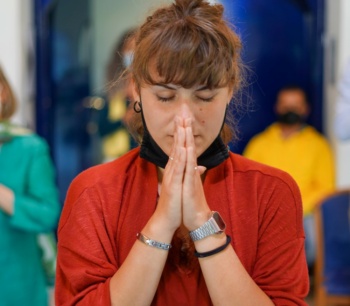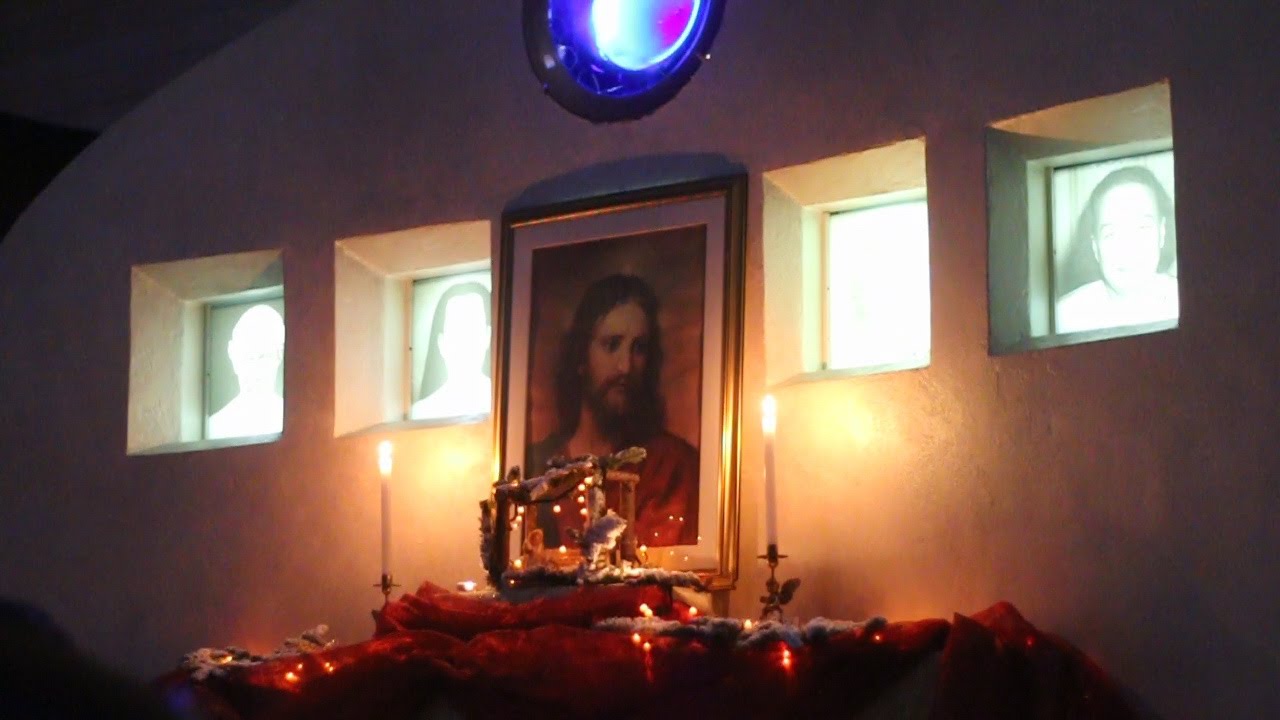From the Gift of Compassion to The Gift of Light
« Away in a manger
No crib for a bed
The little Lord Jesus
Laid down His sweet head… »

This Christmas carol sings in my head as I set out the creche next to where our Christmas tree will soon stand. It’s a beautiful creche, bought in the streets of Naples, representing a grotto, adjacent to an old house nested in a hill side. Mary and Josef are standing between the ox and donkey, waiting for baby Jesus. A shepherd is nearby with his three sheep; a maiden carries a basket near the well of the house, while the three kings have symbolically started their journey from the other side of our dining room.
«… The stars in the bright sky
Looked down where He lay
The little Lord Jesus
Asleep on the hay. »
The warmth of the fire in our stove and comfort of our home contrasts with the humility and humidity of the symbolic grotto in our creche. This nativity scene brings back to my mind and heart what was so central to Jesus’s teachings: that the wealth we seek is not to be found in material riches.
The other message Jesus shared his entire life, starting with his birth in such a simple setting, is his invitation to open our hearts to our brothers and sisters struck by misfortune and suffering.

@unsplash.com
Looking at the cold grotto, my mind and heart travel to the plains of Ukraine and the mountains of Afghanistan, where – like many places around the world – the harshness of the winter bites bitterly and empty stomachs growl. Imagining Mary and Josef knocking on hostel door after hostel door brings forth the images of the hundreds of thousands of refugees waiting in wet and cold make-shift camps, knocking helplessly on the doors of our countries in search of a haven of peace and opportunity.
“Love thy neighbour as thyself”, taught Jesus.
All great spiritual teachers have echoed this call to love, friendship, and compassion.
Of course, we can only be inspired and seek to answer this call.
But it’s not always easy, is it?

Compassion has been a central part of my journey: my parents and grandparents have always been very active in charities. Since my childhood, I have lived and travelled in many places where I witnessed a lot of poverty and terrible inequities. That is what has driven me to work in the field of humanitarian aid, to live in Afghanistan and travel regularly to sub-Saharan Africa. Witnessing war and the impacts of droughts or other natural disasters was an emotional challenge. But one does not need to travel far and be in extreme situations to witness suffering: illness, poverty, conflicts, solitude or other challenges knock on every household’s door.
In 2018, when I asked for a spiritual name, Jayadev honoured me with the name of “Karuna Devi” (Mother of compassion). I was touched by this reference to such an important part of my life and felt invited to explore further what living with compassion meant, especially if I was simultaneously seeking to live in joy, in Ananda.
Compassion is, literally, an invitation to “suffer with” (cum-passio). How painful it can be to feel another’s suffering; how frustrating, paralyzing and disheartening to feel powerless to help…
How can I be truly happy, I wondered, when there is so much suffering around me? This is for me the greatest puzzle and challenge in my spiritual life, the toughest “nut to crack”.
I decided to try to “crack this nut” by focusing on the niyama of santosha (contentment) as part of my Raja Yoga teacher training programme. Santosha is considered the “supreme virtue”. The question I asked myself is: how can I be content when I suffer (when my deepest desires are not fulfilled), when people who are close to me suffer, and when others in the world suffer?
The first part of the question was the easiest. Since coming on the path of Self-Realization, I know that whatever challenge comes my way is an “opportunity for further growth”. I’ve learned that obstacles and pain are the beacons that strengthen me and show me the way to an ever-deepening bliss, in the very core of my being.
But feeling content and joyful when others suffer? That I still don’t master.
2021 proved to be full of opportunities to address this conundrum.
From August 2020 to January 2022, I worked on a project which made me collaborate (online) with colleagues in Haiti, Mali, Chad, Burkina Faso, Guinea, Madagascar, Yemen, Afghanistan and other countries where droughts, military coups, earthquakes, hurricanes, war, famine were all regular occurrences, not to mention the COVID-induced economic crises. The most challenging event for me was the Taliban take-over of Afghanistan: having lived there many years[1], I have many Afghan friends who were at immediate risk of being arrested or killed. Internet apps made it easy to communicate despite the political, economic and social breakdown of the country, so I could follow their ordeal daily, while feeling very constrained in how I could help. The situation was haunting. I ended 2021 literally paralysed with a lumbago for several weeks.
Meditating on these experiences and attempting to practice santosha helped me start cracking the nut of this apparent contradiction: that compassion and contentment are not incompatible.
In fact, they might even go hand in hand…

Part of the answer I have found so far is that both compassion and contentment require us to crack open the shell of our heart. Compassion is about daring to feel, daring to care, daring to love. And yes, that means daring to suffer, but it also means opening the door of our heart to joy.
One is certainly in pain when one’s friends suffer, but what joy one feels when progress, even a small step, is made! Several of my Afghan friends’ and their families have now made it to safety. Seeing one my friends’ teenage son post happy pictures of his new life in the US in social media, or hearing another friend tell me how her 4-year-old told her joyfully “thank you mummy for bringing me where there are no men with guns everywhere” just makes my heart melt with gratitude.
Compassion and contentment both invite us to work on acceptance. Many of my friends are still in very challenging situations. I am learning to accept that a person has their own karma to work out and that taking “opportunities for growth” away from them is not always helpful. Asha provided me with very useful advice when visiting France during the Joy Tour: when somebody is facing a challenge, rather than praying for the challenge to go away, she prays that they learn the lesson they are given the opportunity to learn as fast as possible, so that they be released from this karma as soon as possible.
But acceptance should not be an excuse to turn a blind eye. Santosha is not smugness. That’s where compassion – and the indignation that comes from feeling another’s pain – kicks in to drive us to do something. If a person’s suffering comes our way, it probably means that our own karma invites us to be by their side in one way or another, to remember we are one in Spirit.
I have been truly inspired by a dear American friend who has deep faith and invested all her energy since a year and half to help dozens of Afghan families find a safe home. Her faith has made her literally move mountains and it’s thanks to her relentless efforts that some of my friends have reached safety. Seeing how active she was, I often felt guilty I was not doing more.
The situation made me reflect and meditate deeply on my own priorities: where and how am I asked to serve? One must indeed make choices as carrying the weight of the world is seldom helpful; it certainly does not help experiencing santosha and inner peace.
The answer was not that I should spend most of my time working on refugee asylum applications (though I am doing some of that and if you have contacts or advice regarding asylum opportunities in your countries, advice welcome! 😉). My heart’s answer has been that I should continue to focus on projects where I find profound meaning and joy (including building “Ananda Sangha Francophone” with my dear francophone gurubais, for example). The joy I feel devoting to these probably indicate that they are part of my dharma.

The situation is also teaching me the importance and power of prayer (we’ve seen miracles happen with some families), and the infinite value of presence. Just knowing somebody cares is already very valuable for people going through tough times. Afghan friends in dire circumstances would tell me on the phone, even as I could do very little, “Speaking to you makes me feel better; your energy makes me feel more calm and hopeful”.
Such words are true gifts that warm my heart. These relationships make me realize that the gift of compassion goes both ways – it is about two hearts connecting and nourishing each other; it is about friendship.
“God’s effort to unite strife-torn humanity manifests itself within your heart as the friendship instinct.” (Yogananda in “How to Love and Be Loved”)
The two-way exchange is also what I have witnessed in my exchanges with peers and colleagues in Mali, Haiti, Madagascar, Yemen, Chad and other crisis-affected countries: while their country (and probably themselves and their families) go through very trying ordeals, I never heard them complain or seek pity. They are simply too busy trying to improve the situation of their fellow citizens. The inspiration provided by their dignity, resilience and creativity is also a precious gift.
The final, and probably most important, lesson I have learned so far is that the two-way connection I describe is actually a three-way connection: it is one nourished by divine light and love.
I consider this lesson to be the “nut-cracker”: compassion can be infinite, resilient and joyful when one is connected to and guided by Spirit, when one is a channel for this light.
I had understood this with my head a while ago, but it took a special gift to fully crack the nut.
During her visit in France last month, Asha gifted me with a new spiritual name: “Jyotiprasad” – “Light that is a gift from God”. “To live with compassion, to shine light where there is darkness”, she explained, “you need to ground yourself and be nourished by the light of God. If you give from your own limited reserves, you burn out”. Those words resonated very strongly.
And so, that is what my meditations are about now: I focus on receiving this Light. Doing so gives me so much joy. I not only feel my joy, I also feel the joy of Spirit. The light fills my heart, and the gratitude I feel makes it grow.
Asha gave me another gift besides the name her book Swami Kriyananda: As We Have Known Him. I never met Swami, having first come to Ananda in June 2013. But I now see how he was/is an amazing, living example of joyful compassion. Ever story in this book guides and grounds me.
Jesus came to remind us that we are children of God, and Yogananda has come to repeat this message loud and clear. These are not empty words or abstract concepts: they point us to a very real, tangible source of Love that is longing for us to connect to it, that is compassionate with us, that longs to help and love us.
I see now that the gifts that Christ invites us to put under our Christmas tree are the gifts of compassion and friendship, the gifts of light and love.
I wish you a very joyful and compassionate Christmas, full of the Light of Christ!
Note: If you are interested to support Afghan refugees, you can contact Jyotiprasad at charlotte.dufour@narayan-inspires.org

Merry Christmas!
[1] I shared this experience in the book Land of Eternal Hope – 10 years of Lives shared in Afghanistan (the original, in French, is: Amitiés afghanes, dix ans de vies partagées)

2 Comments
Beautiful, articulate, and timely article, Jyotiprasad! Thank you so much. 🙏
Thank you Dambara! Merry Christmas! 🎄🌟💙✨